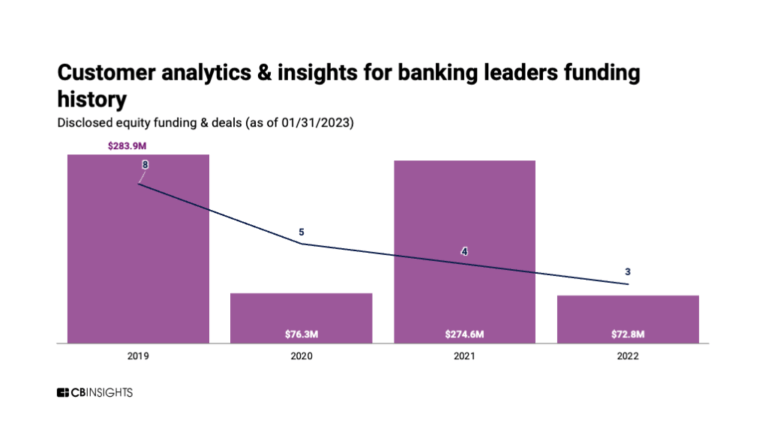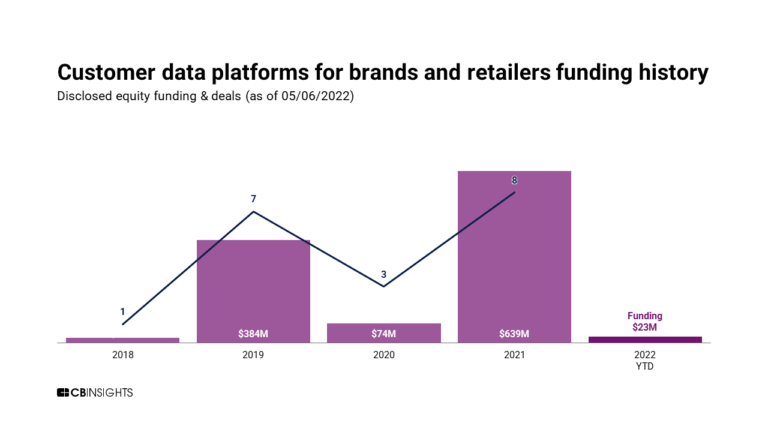
Tealium
Founded Year
2011Stage
Secondary Market | AliveTotal Raised
$263.9MMosaic Score The Mosaic Score is an algorithm that measures the overall financial health and market potential of private companies.
-68 points in the past 30 days
About Tealium
Tealium operates in the field of customer data integration and management within the technology sector. The company provides a customer data platform that allows businesses to collect, unify, and use customer data in real-time, while also focusing on data quality and compliance with privacy standards. Tealium's solutions serve various sectors including marketing, data analytics, and IT. It was founded in 2011 and is based in San Diego, California.
Loading...
Tealium's Product Videos
_Demo_thumbnail.png?w=3840)

ESPs containing Tealium
The ESP matrix leverages data and analyst insight to identify and rank leading companies in a given technology landscape.
The customer data platforms (CDP) market is focused on providing a single view of the customer. CDP vendors offer solutions that unify customer data, segment profiles into actionable groups, activate segments across martech and adtech ecosystems, and provide real-time interaction management. This enables companies to offer personalized experiences across the entire customer journey. It also addres…
Tealium named as Outperformer among 15 other companies, including Microsoft, Oracle, and SAP.
Tealium's Products & Differentiators
Tealium iQ Tag Management
Tealium iQ Tag Management allows businesses to collect and manage client-side customer data and marketing technology vendors across web, mobile, IoT, and connected devices. It provides a centralized solution for configuring and publishing tracking tags, ensuring data consistency and quality. This product simplifies the implementation of tags, which improve the efficiency and accuracy of data collection. It integrates seamlessly with a wide array of analytics and marketing technologies.
Loading...
Research containing Tealium
Get data-driven expert analysis from the CB Insights Intelligence Unit.
CB Insights Intelligence Analysts have mentioned Tealium in 7 CB Insights research briefs, most recently on Jan 4, 2024.
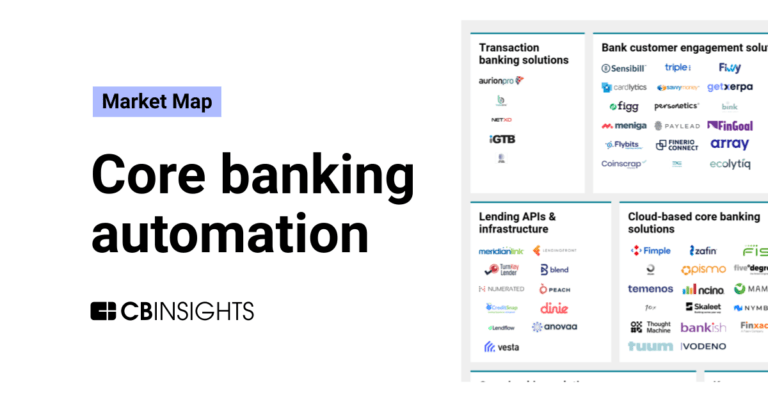
Jan 4, 2024
The core banking automation market map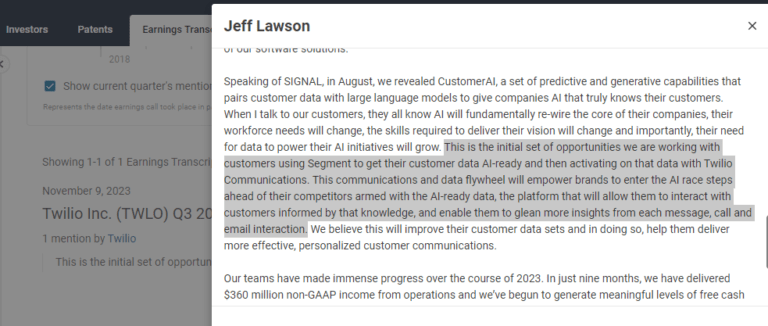
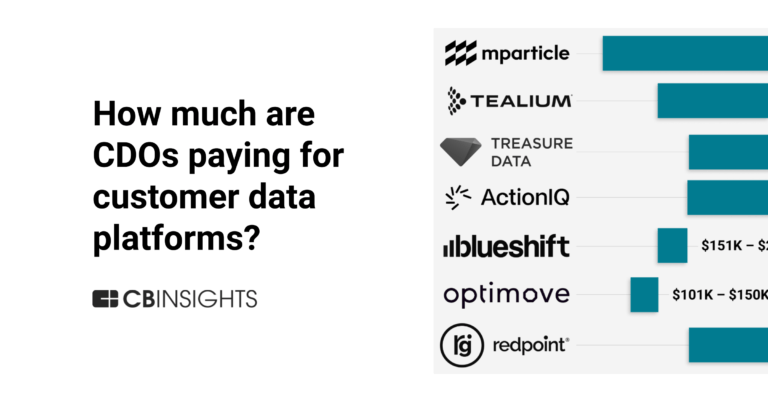
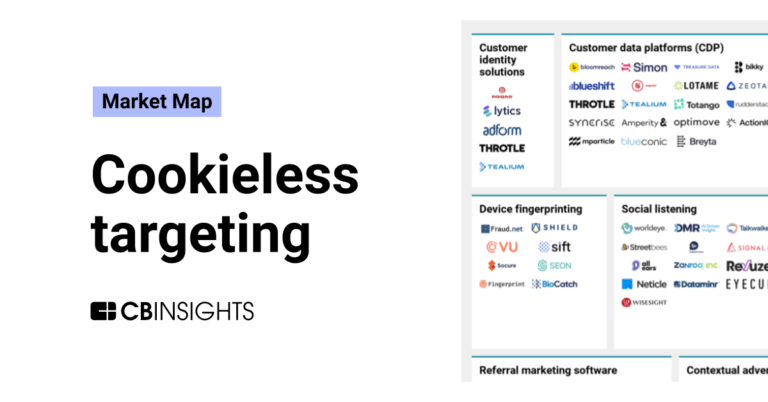
Aug 14, 2023
The cookieless targeting market map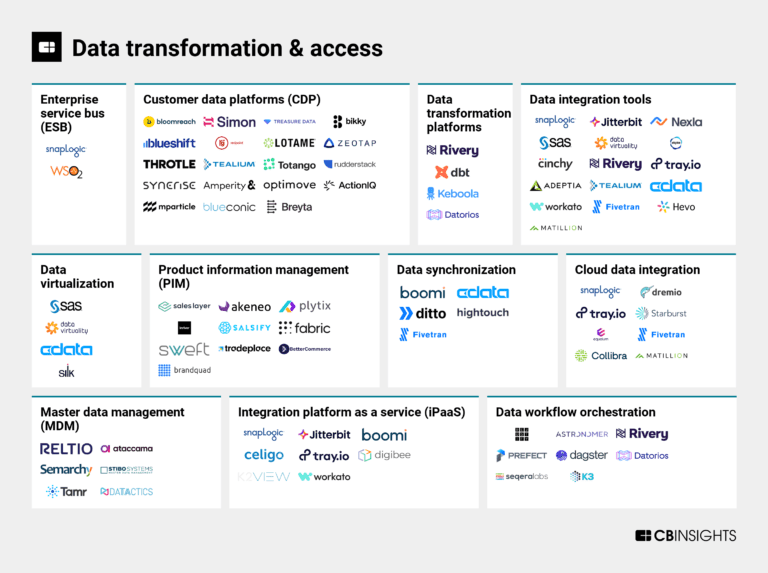
Aug 4, 2023
The data transformation & access market mapExpert Collections containing Tealium
Expert Collections are analyst-curated lists that highlight the companies you need to know in the most important technology spaces.
Tealium is included in 7 Expert Collections, including Unicorns- Billion Dollar Startups.
Unicorns- Billion Dollar Startups
1,276 items
Tech IPO Pipeline
286 items
Ad Tech
4,236 items
Companies offering tech-enabled marketing and advertising services.
Fintech
9,653 items
Companies and startups in this collection provide technology to streamline, improve, and transform financial services, products, and operations for individuals and businesses.
Targeted Marketing Tech
659 items
This Collection includes companies building technology that enables marketing teams to identify, reach, and engage with consumers seamlessly across channels.
Retail Media Networks
324 items
Tech companies helping retailers build and operate retail media networks. Includes solutions like demand-side platforms, AI-generated content, digital shelf displays, and more.
Tealium Patents
Tealium has filed 79 patents.
The 3 most popular patent topics include:
- data management
- social networking services
- network protocols

Application Date | Grant Date | Title | Related Topics | Status |
|---|---|---|---|---|
6/2/2023 | 2/11/2025 | Computer memory, ER (TV series), Social networking services, Data management, Recording devices | Grant |
Application Date | 6/2/2023 |
|---|---|
Grant Date | 2/11/2025 |
Title | |
Related Topics | Computer memory, ER (TV series), Social networking services, Data management, Recording devices |
Status | Grant |
Latest Tealium News
Jul 8, 2025
MarTech Interview with Simon Taylor – Principle AI Strategist at Tealium Comments Off on MarTech Interview with Simon Taylor – Principle AI Strategist at Tealium This interview highlights how AI is reshaping customer data strategies, powering real-time personalisation, and addressing the complexities of modern marketing. Simon, as Tealium’s Principle AI Strategist, how does your background shape the company’s strategic direction, and how does Tealium’s AI-driven approach benefit different industries? I have worked in the data and analytics industry for a while, decades in fact! If I look back now, originally at WebTrends and subsequently WebSideStory, then Ominture, we were always taking data and initially turning it into reports that showed how consumers arrived on websites and what they did there. This was typically historic, backward looking and didn’t allow any real influence or control of what a consumer experienced. That then led to the next logical step in how we take the insight and influence those consumers, both in terms of how they’re acquired in the first place (e.g. SEO and campaigns) and then how their journeys can be successfully driven towards a sale or successful outcome for a brand. As data volumes grew and billions of signals bounced across channels every minute, it became nearly impossible for humans to understand and manage it all at scale. The advent of AI and the power of Machine Learning (ML) has enabled these same data sources to be made sense of and consumer journeys managed in a personalised way, in real-time, that just wasn’t possible before. To more directly answer your question, this all starts with data, and every touch point in any organisation or industry now generates data, so AI is genuinely the next evolution in the data journey that we’ve all been waiting for. Every industry requires AI to implement effective customer data methods. Describe the ways AI technology has improved Tealium’s operation efficiency while helping the company maintain market leadership. AI has significantly enhanced Tealium’s operational efficiency and helped solidify its leadership in customer data management. By enabling smarter real-time data orchestration, AI ensures customer data is routed accurately and efficiently across systems, reducing manual effort. It also supports data quality through anomaly detection and cleansing, which is critical for compliance and decision-making. Through AI-driven predictive models, Tealium helps brands create dynamic audience segments based on behaviour and intent, allowing for personalisation at scale. Internally, AI streamlines workflows and reporting, freeing up teams to focus on strategic initiatives. All of this accelerates time to value for clients, empowering them to launch more effective, privacy-compliant campaigns, keeping Tealium at the forefront of the industry. Aside from our platform, which is fundamentally designed for real-time data collection, processing, and activation—we also actively embrace the broader AI ecosystem across our organisation in a variety of ways. For example, we use tools to help catalogue and surface all our documentation, and recording use-cases and setups with outcomes. So I can ask a question like: ‘What are the top 3 use cases deployed by telecommunications customers in EMEA, and what KPIs are being measured?’ Our development teams leverage a variety of AI capabilities when they’re exploring new capabilities and adding new functionality to our platform. One of the key benefits and challenges with AI is its rapidly moving pace. Also the advent of Model Context Protocol (MCP) is something that allows 3rd party capabilities to be easily woven into a technical architecture, so experimentation and learning is far accelerated from where it was even 2 or 3 years ago. How crucial is AI for real-time analysis of a large amount of customer data, and what advantages does it provide to businesses? Any specific examples where this capability has led to immediate business improvements? AI is the enabler for companies to analyse massive amounts of customer data in real-time, uncovering patterns and predicting needs before they arise. With intelligent automation and predictive analytics, businesses can deliver timely, personalised interactions across channels, boosting engagement, loyalty, and growth. This real-time responsiveness is key to creating seamless omnichannel experiences and reducing friction throughout the customer journey. One of Vodafone’s first CDP campaigns centred around a personalised availability check on their website. Using the CDP, they captured real-time visitor data, built audiences based on 360 customer profiles, and fed those insights back into their targeting engine to display tailored banners. The result? A 10–30% uplift in conversions compared to a control group that didn’t receive personalisation, proving the value of smart, timely re-engagement. Vodafone’s most advanced use case uses a machine learning model to predict which users are most likely to convert, enabling smarter engagement across channels. Built in-house using a random forest algorithm, the model identifies high-intent users with a 67% likelihood of purchase within the next hour. One standout application: these users are shown a personalised hotline on the website and prioritised in the telesales queue, creating a “fast lane” experience. The result? More than 50% increase in conversions from these calls, proving the power of predictive intelligence in driving real business impact. The e-commerce team of a global electronics company set out to bridge the gap between data collection and activation. Their goal was to transform raw browsing data into actionable insights quickly enough to influence customer decisions in real time, especially to prevent cart abandonment. The solution involved connecting AI models with customer interactions, marketing tools, and data warehouses to ensure every use case was powered by accurate, compliant, and up-to-date data. This created a continuous stream of user behaviour data that could be processed and activated instantly. Please explain which techniques you regard as most suitable to help organisations resolve their common obstacles while implementing AI into data strategies. In addition to ensuring that the data being used is well-structured, consistent, and compliant, especially when dealing with consumer data, one of the most important factors for success is agreeing on how success will be measured from the outset. Too often, organisations dive into the technical side of AI projects without a clear view of the intended business outcomes. With today’s ease of adding new AI models or components at the click of a button, it’s easy for initiatives to turn into science projects that lose focus. To stay grounded, it’s critical to tie AI efforts to tangible business objectives. For instance, in a telecom company, aligning an AI initiative with a goal like increasing new customer sign-ups is far more likely to gain executive support than one with less measurable impact. AI-based customer analytics proves to be a transformative force that benefits many different business operations. Tell us about the specific qualities AI tools create that empower businesses to generate improved insights from their customer data. Can you share a real-world example? AI enables rapid, data-driven decision-making in seconds and can be deployed across a wide range of channels and systems. Take companies in the consumer electronics sector: their electronic components division uses insights from historical purchase data to offer customers curated catalogues tailored to predicted needs, based on past project trends. This not only helps consumers quickly find the right components but also allows the business to prioritise products based on stock levels or profit margins, creating a win-win for both sides. What elements do you think business organisations should focus on for AI-based customer data strategy development to succeed, particularly in terms of scalability and growth? The most important thing to keep in mind is that every business ultimately exists to serve its customers. That means any initiative, especially one that touches the customer journey, must be approached with a holistic view, including your data strategy. AI shouldn’t be treated as a siloed, one-off solution. For example, deploying an AI chatbot might seem like a smart move because it’s trending, but its real value depends on how it fits into the broader customer experience. You need to consider where in the journey it’s triggered, who it serves, what purpose it fulfills, and how it contributes to key experience and business metrics like customer satisfaction, site conversion, or call deflection. Without that context, even the smartest tool risks falling flat. To succeed in AI-based customer data strategy development, particularly with scalability and growth in mind, companies need to prioritise several core elements. High-quality, privacy-compliant, and unified data is essential, as AI performance depends on the accuracy and consistency of its inputs. Real-time infrastructure is also critical—businesses must be able to collect, process, and activate data instantly to deliver meaningful, in-the-moment experiences. A scalable, cloud-native architecture that integrates easily with other systems enables rapid growth and experimentation. Success also depends on cross-functional collaboration between marketing, IT, data science, and legal teams to align objectives and execution. Clear, outcome-driven use cases should guide AI efforts from the start, backed by measurable KPIs such as improved conversion or reduced churn. At the same time, organisations must embed ethical AI practices and consent management to build trust and ensure compliance at scale. And finally, continuous learning and feedback loops are essential to refine models and strategies over time, transforming data and AI into long-term business value. Through AI-driven predictive analytics organisations obtain the ability to forecast how their customers will behave. Please describe how businesses can correctly utilize this technology to develop customer need predictions, ensuring they don’t just rely on predictions but also continuously adjust strategies based on evolving customer behaviour. This is an interesting area, as sometimes the needs of the organisation may differ from those of a customer. For example, we have clients who are using predictive modelling to anticipate churn, for a telecoms company that’s one of their main business metrics – for a consumer wishing to move away, their objective is therefore not aligned. That said, by using predictive modelling early enough, we’re finding that intervention can be made before a consumer gets to the point of deciding to leave. In a telco environment there are typically a few key activities that can indicate churn risk, intervention at that stage or awareness of that to promote an offer for example are effective ways to mitigate churn before it’s too late. The Intelligent Data Platform offered by Tealium acts as a fundamental element to execute AI-enabled strategies. How does this platform enrich data to ensure that AI models are trained on high-quality, accurate data for better decision-making? If we think back to the old days, data was logged, stored and processed and needed enormous amounts of human configuration to make sense of relationships between data points, let alone how they may relate to an individual consumer. Then if you layer on top the need for context, the puzzle gets even more complicated. For example, it may be easy to determine that an event is linked to a view of a product on a web site or in an app, but that in itself isn’t useful or actionable in any decision making process. It may be interesting to understand what are the top 10 products being viewed or purchased, but again, that’s just reporting and what we were doing decades ago.
Tealium Frequently Asked Questions (FAQ)
When was Tealium founded?
Tealium was founded in 2011.
Where is Tealium's headquarters?
Tealium's headquarters is located at 9605 Scranton Road , San Diego.
What is Tealium's latest funding round?
Tealium's latest funding round is Secondary Market.
How much did Tealium raise?
Tealium raised a total of $263.9M.
Who are the investors of Tealium?
Investors of Tealium include CrossWork, Battery Ventures, Tenaya Capital, Silver Lake, Georgian and 13 more.
Who are Tealium's competitors?
Competitors of Tealium include Cohesity, Lotame, Lockr, Piano Software, mParticle and 7 more.
What products does Tealium offer?
Tealium's products include Tealium iQ Tag Management and 4 more.
Loading...
Compare Tealium to Competitors

BlueConic provides a Customer Data Operating System for businesses to utilize customer data in various industry sectors. Its solutions offer support for data integration and data sharing and are applicable in consumer goods, retail, media and publishing, telecommunications, and financial services. It was founded in 2010 and is based in Boston, Massachusetts.

Amperity is a customer data platform (CDP) that focuses on identity resolution and data normalization within the marketing technology sector. The company provides tools to unify, analyze, and optimize customer data for marketing campaigns and customer experiences. Amperity's solutions assist brands in understanding their customers, facilitating engagement and privacy compliance. It was founded in 2016 and is based in Seattle, Washington.

Simon Data is a company that provides a Customer Data Platform (CDP) within the marketing technology sector. The company offers tools for personalization, analytics, and identity resolution, allowing marketers to unify customer data, create audiences, and personalize customer journeys across various marketing channels. Simon Data serves the retail, travel & hospitality, subscription, and marketplace industries. Simon was formerly known as Radico. It was founded in 2014 and is based in New York, New York.

Blueshift focuses on intelligent customer engagement and cross-channel marketing. The company offers a platform that uses artificial intelligence to automate marketing messages and unify customer data. Blueshift primarily sells to sectors such as retail and e-commerce, personal finance, media and publishing, and digital health. It was founded in 2014 and is based in San Francisco, California.

Zeotap is a customer intelligence platform that operates in the data solutions and marketing technology sectors. The company offers a Customer Data Platform (CDP) for integrating and unifying customer data, as well as targeting segments for programmatic and social platforms. Zeotap also provides a universal marketing ID initiative, to address the challenges of a cookieless future. It was founded in 2014 and is based in Berlin, Germany.

SalesManago is a European SaaS company that provides customer engagement and marketing automation solutions for the eCommerce industry. The company offers a platform that supports customer journeys and incorporates AI-driven tools for marketing. SalesManago's services are aimed at mid-size eCommerce businesses focused on customer acquisition, conversion, and engagement. It was founded in 2012 and is based in Krakow, Poland.
Loading...

